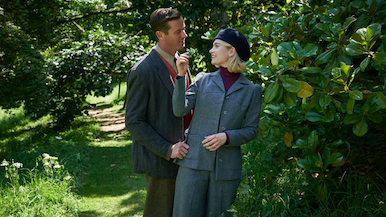The 400-Word Review: Rebecca
By Sean Collier
October 24, 2020
BoxOfficeProphets.com

No expense was spared in the undeniably sumptuous production of “Rebecca,” an 80-years-later remake of the Best Picture winner based on Daphne du Maurier’s novel. Beautiful locations, lavish sets, costumes so ornate they probably earned an Oscar nomination the moment they were designed: All this and similar finery awaits viewers who saddle up for Netflix’s new take on the tale of gothic mistrust.
What those viewers will not get, unfortunately, is much intrigue. I don’t relish saying it — as I said, I can tell that all involved were fully committed and doing their best — but the primary reaction to this “Rebecca” will likely be abject boredom.
The tale is the same, with a few minor revisions in the final act. A lovestruck young woman (Lily James) is pulled into a whirlwind romance with a super-rich widower (Armie Hammer) and brought to live at his fantastic, if foreboding, English estate. There, she finds the spectre of the late Rebecca looms large — particularly in the mind of Mrs. Danvers (Kristin Scott Thomas), the imperious head of the house. As the young bride attempts to navigate her new world, she will unwittingly stumble into a deeper mystery about her predecessor’s demise.
The folly of this “Rebecca” is not in simply attempting to revive a landmark piece of cinema; it’s been most of a century since the last one, so there’s no fault in trying. Rather, the folly is not in doing anything of note with it — and thus being left with characters that don’t translate well to the year 2020.
James attempts to split the difference and make our heroine simultaneously plucky and overwhelmed; it’s not just attempting to walk a tightrope, it’s attempting to walk a tightrope that trails off in mid-air. Hammer, meanwhile, follows the adaptation — written by Jane Goldman, Joe Shrapnel and Anna Waterhouse — in making his character darker and angrier than in the prior incarnation. This only makes it implausible that anyone would marry him in the first place.
The biggest of the film’s failings is the poor rendering of Manderley, the mysterious estate that is in many ways the central character of the story. It should be a tempting, if intimidating, place of wonder; here, it’s a sleepy and imposing structure without a soul.
In that regard — soullessness — Manderley is sadly appropriate for this “Rebecca.”
My Rating: 3/10
“Rebecca” is now streaming on Netflix.